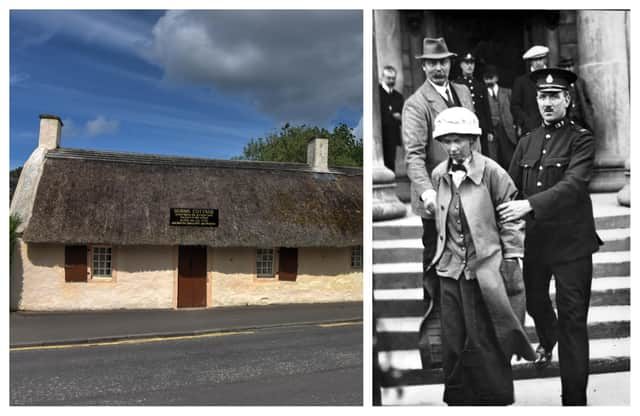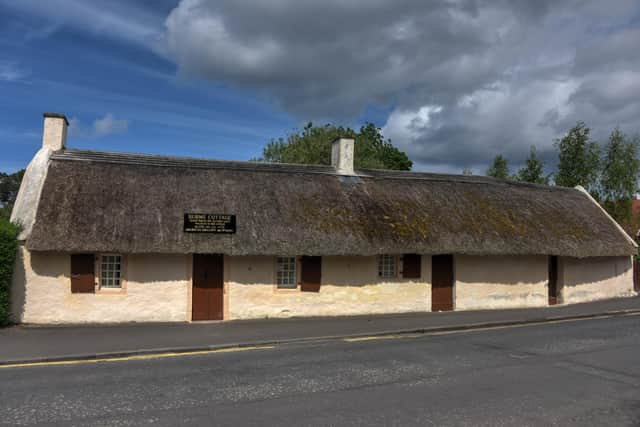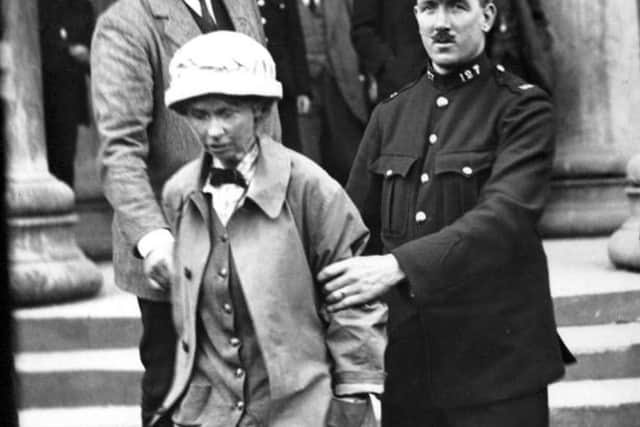Robert Burns: The suffragettes who tried to blow up the bard's birthplace


Suffragettes Frances Parker and Ethel Moorhead arrived in Alloway in July 1914 with a “dastardly” plot to blow up Burns Cottage, the birthplace of the bard, as part of the increasingly militant campaign to secure votes for women.
It came after a number of high-profile attacks, including the burning down of Leuchars Rail Station and the destruction of a stand at Ayr Racecourse the year before. Nervousness was running high and security was tightened at Burns Cottage.
Advertisement
Hide AdAdvertisement
Hide AdAt Alloway, Parker, from New Zealand, and Moorhead, ditched their bikes and carefully unwrapped their home made devices, both which had a fuse attached, from sheets of brown paper.


It is said, like the 60,000 other annual visitors to the cottage around that time, they kneeled a the back door of the bard’s former home. Then, they set about trying to destroy it.
But as they scuttled around the property, they alerted nightwatchman Rob Wyllie with the attempt ending in a violent struggle, the escape of Moorhead and the arrest and imprisonment of Parker, who later went on hunger strike in her cell over the force feeding of suffragette prisoners at Perth
In Alloway, there was outrage that the cottage was targetted.


“The fact that an attempt was made to destroy a shrine that Scotsmen in all parts of the world regard as sacred has roused in the locality the most intense indignation,” one newspaper report of the day said.
Parker, who was a niece of Lord Kitchener, Secretary of State for War, was charged with attempting maliciously to destroy Burns's Cottage” and appeared at Ayr Sheriff Court the following day.
In the dock she quoted burns, reciting 'Liberty's in every blow, let us do or die’ from ‘Scots Wa Hae’ - or Robert Bruce’s Address to His Troops at Bannockburn.
She told the court, in reference to the force feeding of female suffragettes at Perth Prison.: “You Scotsmen used to be proud of Burns; now you have taken to torturing women.”


Advertisement
Hide AdAdvertisement
Hide AdDr Paul Malgrati, from the Centre for Robert Burns Studies at Glasgow University, said he believed Burns’ poems and legacy was not the intended target of the bomb plot.
He said: “In court, I think she was trying to assert that Burns’ radicalism, as shown in the line she recited in court, was incompatible with the way her fellow suffragettes were being treated in prison.
"By turning against Burns's heritage, Parker & Moorhead were paradoxically claiming Burns's legacy.”
Further research by Dr Malgrati found that suffragette Helen Crawfurd, at a rally outside Perth Prison the following day, told the crowd of her ‘Scottish sentiment in being glad the destruction hadn’t been accomplished’.
However, she went on align the act with Burn’s egalitarian legacy, reciting the lines from The Rights of Woman:
"While quacks of State must each produce his plan, And even children lisp The Rights of Man; Amid this mighty fuss, just let me mention/The Rights of Woman merit some attention.”
